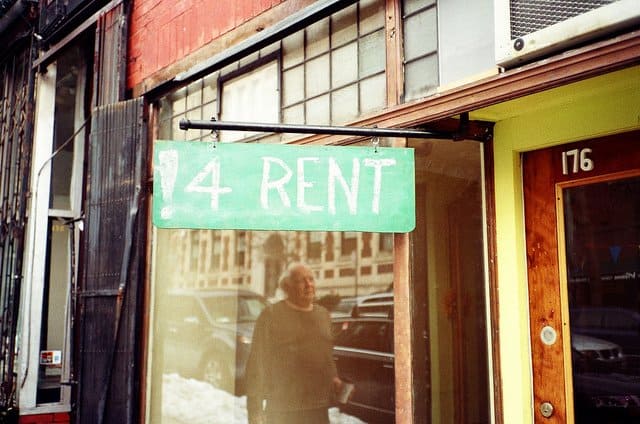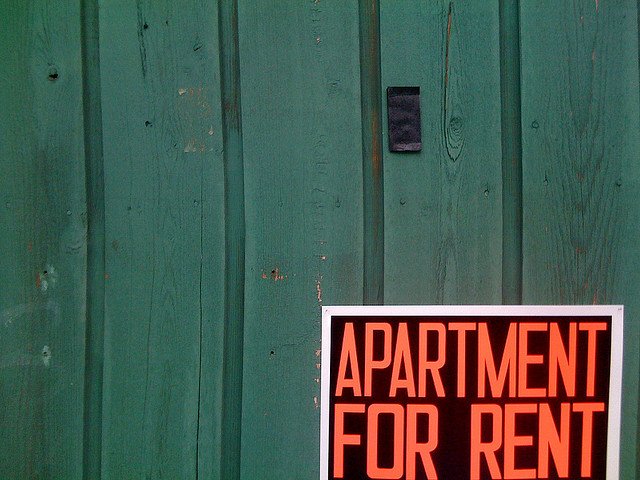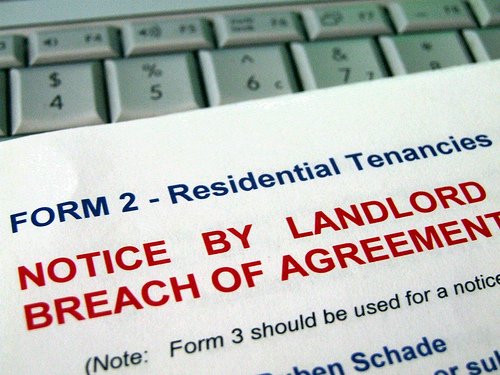It was exciting to reach a point in our lives when we were finally able to invest in some real estate. Not to live in ourselves mind you; we still rent the places we live in because we haven’t settled down yet. But one sunny day back in 2006 we made an offer on a very small house on a big block only five minutes from the ocean in the northern suburbs of Perth. And so began the story of us and The House.
John hates The House. I crap on about how it will be a good investment for the future and that we won’t regret it when the value doubles years from now. And I’m sure it will be years because the price of houses in Perth has sort of stagnated while rents just keep climbing higher and higher. So despite our big mortgage, it’s been working out for us alright as a tax break and we don’t put too much money towards it each month relative to everything else. Money is not the reason John hates The House. He hates it because, quite frankly, it’s a huge pain in the arse. When we started off with it we self-managed and had to deal with almost monthly hassles. We’re model tenants: we keep everything clean, pay the rent on time and rarely ever bother the landlord for anything. For the last several years we have not been reaping what we sow. We were living on the other side of the country as well, which made everything just that little bit more challenging. So before heading overseas on our around the world sabbatical we finally put the house with an agent. And here is where this post may start to have some relevance for you. If you’ve decided to travel for awhile or relocate overseas for a job, you may want to hold onto some property and rent your home while you’re away. We’ve learned many valuable lessons over the last five and a half years. This is by no means intended to be a comprehensive guide to property management and I am not a licensed agent or tax specialist, but if you’re thinking about renting your property while you travel there are a few things you should consider.
Employing a Real Estate Agent
I highly recommend hiring an agent to manage your property while you’re away. It may sound easy to do everything via email and direct deposit, but issues will arise and you need to think about how you’ll deal with these while you’re away. When we lived interstate we had John’s parents assisting us with property management and, despite the fact that they know way more about houses and are infinitely more handy than we are, this was still not an ideal situation. Because no one is just sitting at home waiting to deal with your property and tenant problems. Our parents are incredible and look after so much for our house because we don’t live in Perth, but we didn’t feel comfortable in the long-term sticking them with the day to day things or expecting them to hop to it when an emergency situation arose. It just isn’t fair. And these are the types of things that can happen:
- burst pipes, gas leaks, electrical faults, broken hot water or sewerage systems
- a leaking roof, flooding, storms, fires
- appliance, heating or air conditioning breakages
- the tenant may stop paying rent and you have to take him to court
- the tenant may break the lease unexpectedly and you have to find a new tenant right away
Periodic inspections are necessary to ensure that your property isn’t being damaged and someone reliable needs to be around to do those and enforce any breaches to the rental agreement. Even if you rent the property to someone you know there may still be issues and dealing with them from overseas will be very difficult, if not a serious damper to the enjoyment of your travels. Trust me. You want to hire an agent. The good thing about agents, at least in Australia, is that their services are tax deductible and can usually be negotiated to a satisfactory price. The management fees are deducted straight from the rent that is collected from your tenant so no money upfront is required to employ one. The bad thing about agents is that they are not all created equal and some do their jobs meticulously, while others are completely careless with your property and let the tenants walk all over you. We’ve dealt with both types and I strongly suggest you interview at least three different property managers before trusting your investment to one. Hiring a quality agent is the most important decision you will make with regards to protecting your asset. It is also wise to hire an agent if you’ve lived in the house that you are renting out. Tenants will not necessarily keep things to the same standards that you did and it is important to know the rules in your state or country concerning tenants and rental properties. What is unacceptable to you may still be within the acceptable standards of the law as far as the people renting your former home are concerned. A property agent will be objective in dealing with any problems and has the experience required to handle all the aspects of managing your property.
When you interview property managers, you should be looking at a few specific things:
- Does the person have adequate experience in property management and looking after similar types of properties? Only hire a registered real estate sales representative who works under the supervision of a licenced real estate agent.
- Does the person have knowledge of the suburb, neighbourhood or area where your property is located?
- Are you satisfied with the person’s approach to property management, how she presents herself and how she deals with people?
- Are the agency’s fees competitive and what value do you get for your money? Most agents charge a percentage of the rental income plus one or two weeks rent as a ‘letting fee’ when they find you a new tenant. You will also be charged a fee for other services as required, such as advertising costs, inventory reports if your house is furnished, property inspection reports, lease renewal fees, court costs and usually a monthly administration fee. Don’t judge an agent only on price because as the old adage says: you usually get what you pay for.
- Is the agent comfortable and happy dealing with most things over email and will she keep you informed while you are overseas? Most agents are fine with this arrangement but it’s worth it to mention this fact during your meeting.
- In return, a good agent will be able to handle and advise you on maintaining the property, how much the rent should be, advertise for new tenants, tenant selection, bond/deposit administration, collecting the rent, inventories, inspections, paying bills, court attendance, disputes and any other matters related to the property.
Insurance
Your property should always be insured for the buildings and contents as well as legal liability. As a landlord, however, I highly recommmend that you choose a landlord-specific policy. This will insure you for events caused by the tenant such as rent default, malicious damage and theft. Be sure to review the policy thoroughly to ensure it meets your needs before committing to it and discuss with your agent should you have any questions. These policies also usually include landlord worker’s compensation insurance and this may be required by your real estate agent.
Preparing Your Property For Rental
Most real estate agencies will ask you for a few things before you advertise for tenants. These include:
- Making sure all the external doors are fitted with locks, ensuring there is adequate security at the property and providing copies of the keys to their office. This allows tenants to obtain good contents insurance policies.
- A copy of the By-laws if the property is located in a community or complex with specific ones
- Installing a telephone line if there isn’t one
- Cleaning the property and servicing all air conditioners, pools and other equipment
- Providing all manuals and warranties for appliances and devices in the home
- Supply a copy of the title for the property if you have one (providing this avoids a search fee)
- Bring the property up to code. In Western Australia, for example, landlords are required to have two safety switches (known as residual current devices, or RCDs) and smoke alarms professionally installed to Australian standards before their property may be rented out. Your agent can advise you on any similar requirements and organize a suitable contractor to carry out the work for you. The property’s condition must also comply with all building, health and safety laws. If there is a pool at the property, it must be secure, child safe and compliant with pool safety standards
Additional Tips
1. Get organized. The more meticulous you are with your records and organization of paperwork for the property the smoother things will go with your agent. Yes, the agency will maintain records related to your property for you once it’s under management, but the average agent looks after anywhere between 80 and 110 properties at a time. Your specific property will not be her only concern. This does not mean that you will get bad service or that she is not doing her job (though this does happen and hiring a good agent is one of the most important things you can do to protect your investment). But no one knows your specific property better than you do and having your documents organized so that you can easily refer to something will go a long way towards ensuring a good property management experience. Before you leave home, scan everything into an electronic file and email it to your agent, keeping a copy in your email or on your computer. Put the originals in a safe place. Keep all communication regarding the property in a dedicated folder within your email.
2. Communicate. I’m a little annoying with this but I put everything in writing in an email and always raise questions and concerns with the agent as soon as I think of them or shortly after we meet. Be clear, specific and concise in your emails and use short paragraphs or bulleted lists. This way you’ll have a written record of things that were discussed and the outcome. In the management of our property I am constantly using the search function to call up old emails and remind myself of the exact outcome of any situation.
3. Streamline as much as possible. You’re travelling, remember? Don’t let your property own you while you’re away. Yes, you can set reminders in your calendar for when bills are due or have them come through your online banking. But if you’re using an agent, bill payment is usually included as a service in the management fee. Have your bills for water and council rates and insurance sent to your agent and give her any authority required to make payments and claims on your behalf. Have all the rental income deposited into the bank account that services your mortgage so you don’t have to organize bank transfers. The more you can automate the happier you’ll be.
4. Be prepared. Set aside enough money to meet unexpected costs that may arise such as repairs or periods where no tenants will occupy the property. Make sure there is extra money in your mortgage account to cover any shortfall periods and the months when major bills like water or council rates are due.
5. Choose your tenants carefully. Even if an agent is managing your property, the final decision on which tenant application you accept is yours. A bad tenant will be a nagging headache you have to live with for at least the life of the lease and it will cost you money to fix and re-let the property once he or she is finally gone. A great tenant, on the other hand, is bliss. If you can find someone who pays his rent on time, keeps the place well maintained and stays in the property for several years, you will save a fortune.
6. Think about pets. John and I love animals but we don’t allow them at our property. While there are certain advantages to allowing pets (it widens your tenant base and puts your property in greater demand because so few properties allow them), you have to remember that it isn’t you who will be looking after the animals. I’ve had dogs and seen the damage they can do if not given the proper attention. Our decision might be different if Western Australia allowed us to take an adequate pet bond, however the maximum pet bond allowed by law is a measly $260 and is only allowed to be used for the cost of fumigating the premises at the end of the tenancy. I’ve seen dogs eat holes through drywall and destroy carpeting in several rooms during toilet training. In cases like that, who pays for the damage? In Western Australia, the pet bond may be increased if the rent is more than $1,200 a week or if the property was your private residence for at least three months immediately before the tenancy, so this may be applicable in your area as well.
7. Take action immediately on arrears. It does your tenant no favours to allow them to fall behind so much on the rent that he can never pay it back. Serve notices for rent arrears immediately and discuss the breach policy and procedure for these with your agent. At the end of the day it is up to you whether you want to run a charity for your tenants but our budget is tight when we’re travelling and if the rent falls too far behind that means we pay more towards the mortgage. Think about where you’d rather spend your money.
8. Delegate someone local as an emergency contact. Give his number to your agent and specify the instances where that person should be contacted rather than you. Usually this would be in the case of a real emergency where a decision needs to be made immediately and you are unreachable. If this person is a trusted family member, you may also give him power of attorney, but this needs to be arranged with a lawyer or solicitor before you leave.
9. Plan your time. If you’re only going away for less than a year, be sure to let your agent know so that he doesn’t sign a year lease with the tenant. Should you wish to move back into your property after renting it out, you’ll want to ensure that it’s available.
Do you own a house or apartment that you rent out while you’re on the road? What advice can you add to this post?




